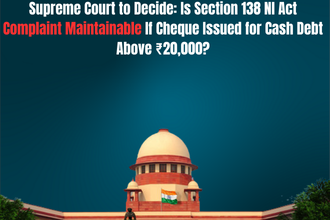The Supreme Court of India, on April 8, 2025, in a significant ruling with implications for employment and commercial contracts, held that exclusive jurisdiction clauses in contracts are not barred by Section 28 of the Indian Contract Act, 1872, provided they do not entirely restrict legal remedies and the designated court has inherent jurisdiction.
This judgment in the case of Rakesh Kumar Verma vs HDFC Bank Ltd and HDFC Bank vs Deepti Bhatia affirms the principle that parties can mutually agree to limit jurisdiction to specific courts, thereby providing certainty in contractual enforcement and reducing frivolous litigation across multiple forums.
Understanding Section 28 of the Indian Contract Act
Section 28 of the Indian Contract Act renders void any contractual clause that:
- Absolutely restricts a party from enforcing their rights through usual legal proceedings in ordinary tribunals;
- Limits the time within which they may enforce their rights (except arbitration clauses).
This section ensures access to justice and prohibits complete ousters of jurisdiction through private agreements.
However, the Supreme Court clarified that this does not mean that parties cannot agree to restrict jurisdiction to one of several competent courts, which is common in commercial and employment agreements.
Key Issue Before the Court
The central question in these connected appeals was:
Does an exclusive jurisdiction clause in an employment contract violate Section 28 of the Indian Contract Act?
The appellants, Rakesh Kumar Verma and Deepti Bhatia, were former employees of HDFC Bank. Their employment contracts conferred exclusive jurisdiction to the courts in Mumbai. However, after termination, Rakesh filed a suit in Patna, and Deepti in Delhi.
While the Patna High Court dismissed the suit, respecting the exclusive jurisdiction clause, the Delhi High Court upheld the suit, holding the clause invalid due to unequal bargaining power between employer and employee.
Supreme Court’s Verdict: Validity of Exclusive Jurisdiction Clauses
A bench comprising Justices Dipankar Datta and Manmohan delivered a common judgment overturning the Delhi High Court’s decision and affirming the Patna High Court’s ruling.
The Court held that exclusive jurisdiction clauses are enforceable if the following conditions are satisfied:
- Compliance with Section 28: The clause must not completely bar access to courts but may limit it to a specific court that already has jurisdiction.
- Competency of the Chosen Court: A jurisdiction clause cannot bestow jurisdiction on a court that doesn’t otherwise have it under the Code of Civil Procedure (CPC), Section 20.
- Clear Expression: The clause must explicitly or impliedly exclude jurisdiction of other courts, often using terms like “exclusive jurisdiction”.
In the present case, all these conditions were met, as the cause of action — including hiring, contract dispatch, and termination decisions — originated in Mumbai.
Equal Treatment of Contracts
One of the key submissions made by the employees was that employment contracts involve unequal bargaining power and should be treated differently from commercial contracts. The Delhi High Court had agreed with this view in Vishal Gupta v. L&T Finance, which was heavily relied on by the petitioners.
However, the Supreme Court expressly overruled Vishal Gupta, stating:
“A contract – be it commercial, insurance, sales, service, etc. – is after all a contract. It is a legally binding agreement, regardless of the parties involved or their inter se strengths.”
The Court emphasized equality before the law and observed that to treat contracts differently based on the status of parties (i.e., a mighty lion vs timid rabbit) would be contrary to the constitutional and contractual principles of fairness and certainty.
Unless a contract is tainted by fraud, coercion, or misrepresentation — i.e., vitiating factors under the Contract Act — its terms must be enforced.
Why Exclusive Jurisdiction Clauses Matter
The judgment recognized the practical realities of modern employment:
- Large private entities like HDFC Bank operate pan-India, hiring employees across states.
- Allowing employees to sue in any location could overburden employers and lead to litigation uncertainty.
- Jurisdiction clauses ensure predictability, cost-efficiency, and legal uniformity.
As long as employees retain their substantive right to sue, such clauses do not violate their access to justice.
Final Holding
In conclusion, the Supreme Court ruled:
- Exclusive jurisdiction clauses do not violate Section 28, provided they do not amount to an absolute bar.
- Such clauses are valid in employment contracts as long as the designated court has territorial jurisdiction under the CPC.
- Courts must enforce the contractual choice of forum, irrespective of the relative power of contracting parties.
- The Delhi High Court judgment was set aside; the Patna High Court’s ruling was upheld.
- The employees were allowed to file fresh suits in Mumbai as per the jurisdiction clause.
Conclusion
This ruling is a watershed moment in Indian contract law, particularly regarding employment agreements. It upholds the freedom to contract, subject to statutory limitations, and ensures that jurisdiction clauses—a standard feature in modern agreements—receive due recognition and enforcement.
It also places employment contracts at par with commercial contracts, reinforcing that the principle of equality before the law must not be diluted based on the status or strength of the contracting parties.
As businesses continue to grow nationally and globally, this clarity from the Supreme Court ensures that contractual autonomy and legal predictability are preserved in India’s legal framework.


